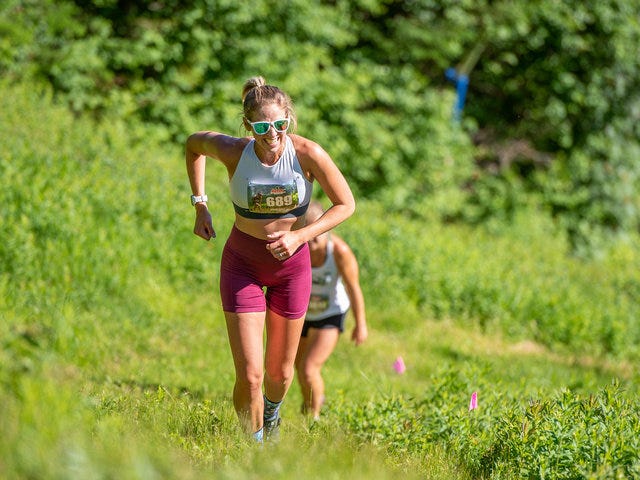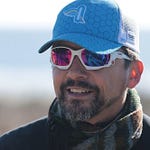It’s a bright, sunshine-y ☀️ morning here in Georgia, where the temperature is expected to rise into the 80s today and spring feels like it really is finally here.
I hope you’ve been enjoying our audio series of conversations with running coaches as much as I have — I’ve learned so much about shifting my own mindset during this time just from the half-hour to 45 minutes or so I’ve spent talking with each coach.
Today, we hear from someone whose name may be familiar to many of you, especially if you follow her on Instagram — Sarah Canney, the founder of Rise Run Retreat, an annual four-day running retreat just for women that takes place in the mountains of New England.
Canney recently introduced a virtual version of the retreat — it was actually something she’d been planning since last fall — and describes how she worked hard to translate the in-person experience into something that works well online, adding that she’s really happy with how it has turned out.
We talked about ways you can get creative with challenging yourself right now at a time when we can’t get together for races, how to shift your mindset to focus on your running (and overall) fitness for the long term, and how important it is to keep in mind why you started running in the first place.
I hope you enjoy hearing from Sarah as much as I enjoyed talking with her — as always, I’d love to hear your feedback on these. So after you’ve heard/read it, fire away!
— Terrell
Sarah Canney: I was not a runner in high school or college, but found it in my early adulthood and it just kind of progressed from being a recreational runner to a more competitive runner, especially in snowshoe running.
What I experienced in my running journey was a real personal transformation, in terms of just growing in confidence in all areas of my life. So the growth in confidence that I was experiencing by running, by setting running goals and then chasing them down and actually achieving some of them translated into my personal life, into how I viewed myself and my perception of myself and what I was capable of.
It was through some major running experiences — I participated in a couple relays that were was really fun — that really boosted my confidence as a runner. And, just experiencing small personal wins, like placing in your age group, winning a local race, little things like that.
One of the things that I saw was that when women came together around these small personal wins and around their love of running, that it really inspired and encouraged each other. Like you didn't have to be a professional or an elite athlete, um, to be inspired, or to be inspiring.
I found that some of the connections that I made in the running community with other women, I was just really inspired by their stories. And so that led me to start Rise Run Retreat — because who doesn't love to get away for a weekend to run and connect with people who also love to run?
That’s kind of how it evolved, just through my own personal journey as a runner, but then this desire to share that with other women. I just picked a weekend, I invited some people and kind of did a beta version way back in 2015 and then from there it's really grown.
Terrell Johnson: How many people come? What time of year does it happen?
Sarah Canney: I'm in New Hampshire, so I've done retreats in the spring and in the fall. Typically we have about 15 women, so I keep it small. There's something that's kind of special about that number of people, in terms of the deeper connections that you make over the course of the weekend. Our spring retreats have been in Vermont and we've had a couple fall retreats in Maine, so we kind of hop around to different New England areas. I was born and raised in New Hampshire and I just love new England and so I do my best to really highlight how special this area is.
‘We could sit home and kind of mope about not being able to go to races, but I think tapping into the joy of running — why you started running in the first place and trying to bring some of that back in — is the way to go.’
— Sarah Canney
Terrell Johnson: You had a post the other day about running challenges that people can do now. I thought that was really interesting because you know, a lot of people train to peak at a certain time and now they don't know what to do. And for those of us who are running half marathons and marathons that now can't do those — unless you do it virtually — [many] people are grasping at straws for what to do.
Sarah Canney: There are plenty of virtual races out there [and] there's a lot of races that are now providing virtual option. For some people that's their thing.
You know, virtual races existed before the whole situation that we're in. [But] that's not necessarily my cup of tea. So, what I have been devising is these personal running challenges and just kind of taking it one month at a time.
Originally I was supposed to run my first 50K in April. So obviously this is kind of required more than one month of preparation, but I was already in training, so I thought, you know what, I'm just gonna do it anyway and, um, I'm going to try and do some good with it.
So, um, I ended up choosing a route that left from my house and circumnavigated my town. And, in that process, I also tried to raise money for a local charity that provides assistance for seniors and school lunch programs and some of our food local food pantries. So that was my April project.
After that was done, I was like, well, what's next? What interests me? really think that's kind of what you have to do is, if the virtual racing is your cup of tea and that's what you want to do, [then] go after that. But if that's not your thing, you can get really creative with other types of challenges. So for me, the month of may is going to be about gaining the vertical elevation of Mount Everest.
That’s 29,000 feet over the course of a month. That'll include some trail running, also some vertical gain on the treadmill. So I'm gonna kinda, I've kinda got a little idea of what I need to do each week and each day to get that done. And then June, I'm going to shift my focus and do a 5K time trial on the road. In July, I'm hoping to go longer than a 50K.
I'm not sure exactly what that's gonna look like, but I know that I'm probably not going to be, like many of us, we're probably not going to be racing until the fall if then. So, um, for me it's just kind of fun to set these personal challenges that don't necessarily have to do with speed. I'm excited about the one because that has nothing to do with speed. That's all about gaining elevation. So I think finding things that interest you and setting some monthly goals as a group is a great way to go about it.

Terrell Johnson: That's really interesting. Especially the Everest one!
Sarah Canney: Considering that I’ll take one rest day per week, that gives me six days [of running each week]. But even out of those six days, usually I typically do some sort of cross training a couple of days a week. I think I worked it out to, I have to do just over 7,000 feet a week. Um, so what I'll probably do is make the weekends like sort of a big day, like maybe like a 3,000- or 4,000-foot day, and then divide up the rest of those 3,000 feet over two to three to four runs during the week.
Terrell Johnson: You will have climbed Everest.
Sarah Canney: Yeah, by the end of May.
Terrell Johnson: I love that creativity, to get you your juices flowing around it because that's obviously what a race does for us, you know?
Sarah Canney: Yeah, totally. I think it's an opportunity. I mean, right now there's an opportunity to be creative. We could sit home and kind of mope about not being able to go to races, but I think tapping into the joy of running — why you started running in the first place and trying to bring some of that back in — is the way to go.
Terrell Johnson: What are you hearing from [the individual runners you coach] about this, about the time we're going through right now?
Sarah Canney: It's obviously really tough because you get your heart set on a certain race or if you're going for a BQ and you had planned on trying to qualify this year to hopefully get into 2021. Obviously that's really difficult now because all the races are canceled. So there's just a lot of disappointment to navigate.
Then also I'm finding that a shift in mindset too, that just because the race is canceled doesn't mean that the training that you're putting in now is for nothing. So I think there needs to be a conversation around the fact that your fitness builds from one training cycle to the next — that more time is going to be an advantage.
I think sometimes, the tendency is when someone seeks out a coach, they have a specific race in mind and a specific timeline in mind. And sometimes that timeline is a lot shorter than it should be. So I think there's managing the disappointment, but then also trying to navigate that mindset shift, to embrace the process and the journey of training.
Terrell Johnson: We're into six or seven weeks of this now, now some places are starting to reopen. I mean, I'm in Georgia; we're not really going out, but many places are still closed. The first couple of weeks it was almost kind of a respite from getting in the car every day. But ... the further and further [you get] into the quarantine and certain things become monotonous. Do you have any thoughts around how people can shift and change their goals the longer that we go into this?
‘Sometimes, the tendency is when someone seeks out a coach, they have a specific race in mind and a specific timeline in mind. And sometimes that timeline is a lot shorter than it should be.’
‘There needs to be a conversation around the fact that your fitness builds from one training cycle to the next — that more time is going to be an advantage.’
— Sarah Canney
Sarah Canney: I think now is a really great opportunity to shift from just a running focus to incorporating a lot more strength training, mobility, cross training.
With gyms being closed, that's obviously difficult for some — but just to shift to strength training, which there's so much that you can do in your own home, even if you don't have any equipment. Also mixing things up with a combination of running and strength training in the same session.
So where you're like running and then stopping at the end of your driveway and you've got your kettlebell or your dumbbells there and you're doing a set and then running again. There's just a lot of things that you can do to, to be creative so that you're not just running — and that you're having a little bit of fun with it too.
I think the fun aspect is important that that helps break up the monotony, but also can introduce some things that are going to be really beneficial for you further down the road in terms of your fitness.
Terrell Johnson: You're going to do a virtual version of your retreat. I'm fascinated with all the different ways people are doing [things] virtually right now, the creativity people are coming up with — can you talk about the virtual retreat?
Sarah Canney: I had started building out the framework for a virtual retreat back in September of 2019. Mostly, I was trying to address just one of the major obstacles that women have for coming to Rise Run Retreat: the travel.
So, the distance of getting to new England, the time away from family — it's a four-day retreat, so you've got to take Thursday to Sunday. And if you're flying in and out, maybe that means another day on either end. So obviously a four-day weekend away, it's not going to be cheap. So, I was really trying to make the retreat more accessible for people who had those things as an obstacle, and that's when I came up with the idea of the virtual retreat that I would try to, as best I could, take the experience of the in-person retreat and translate that into an online format.
I spent most of the fall working on that, just trying to figure out how to make it a unique and impactful experience that had some depth. Sometimes, when things go online, you lose the depth of an in-person experience. So a lot of my time last fall went into trying to create that depth for the virtual experience.
I had always had March 13th on my calendar as the official launch date of the virtual retreat and we launched on Friday the week that basically everything shut down. So I mean, it, it's kind of a happy coincidence on, on my end in terms of just creating this product that suddenly there's actual, an overwhelming need for it because everyone's races have been canceled — people are feeling disconnected, they can't run with their friends.
I've kind of been blown away by the fact that I've been able to achieve the same thing that happens in the in-person retreats — in terms of the openness, the vulnerability, the depth of conversation has actually all been happening online. And I think it's been surprising to the people who've participated that that's happening as well.
Because, when you think of joining something that's online, you don't really think of it being a really rich experience, but it has been. And so that's been really neat. We've also had just had some amazing guest speakers come in and join us during these weekend experiences. So it's been a lot of fun.
Terrell Johnson: The only other question I had was … a lot of us are dealing with a lot of either working and trying to teach kids at the same time and get our running in. Do you have any suggestions or encouragement for people who are in that situation?
Sarah Canney: It's not easy. The thing that I always come back to is ... people talk about balance. But I think that the idea of balance is kind of a myth; you can't be a hundred percent present for every aspect of your life all at the same time.
Last weekend was our virtual retreat. I was a very good virtual retreat host. I was not a very good mom. You know, it's like my attention, my energy, my effort, and my presence was going into creating this experience for 40 women. Um, so I wasn't as present as I would normally be as mom. Um, because my, my attention was with work. And so I think giving a little bit of grace to know that you can't, you can't do it all all the time.
Giving your best to something on one day might look one way and giving your best to something on another day might look a a completely different way. It doesn't always have to measure up to some external or internal expectation. I think that's the biggest thing for this time, because there is so much going on in terms of homeschooling and working from home and add that to this kind of low level of stress that exists because of what's going on in the world right now. Giving yourself some grace at this time is probably the best way to go.
More about Sarah Canney
Learn more about Sarah’s running coaching philosophy and programs at:
Her website, SarahCanney.com
Her annual running retreat, RiseRunRetreat.com
Follow her on Instagram here
Hear more of our audio series with running coaches:











